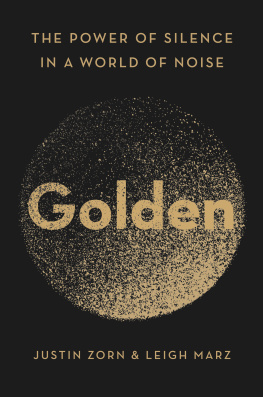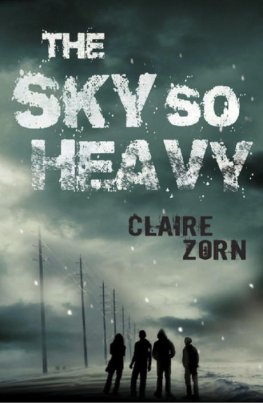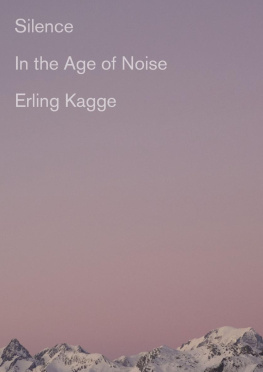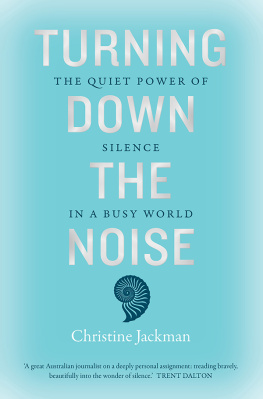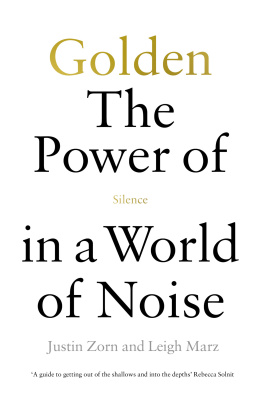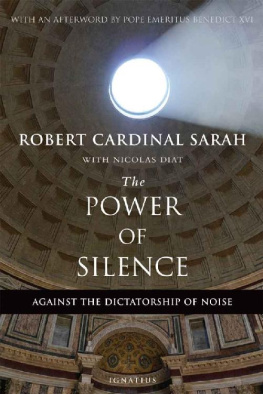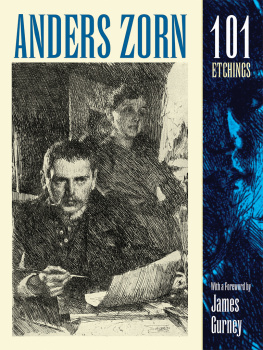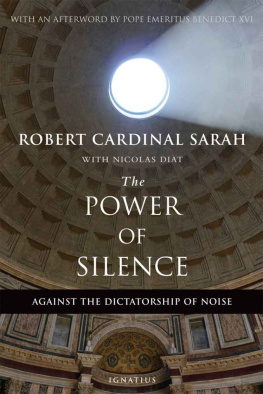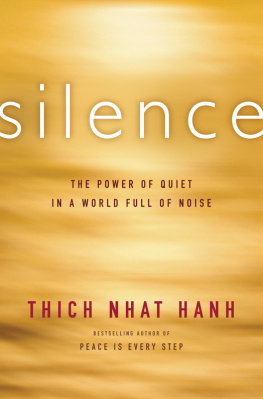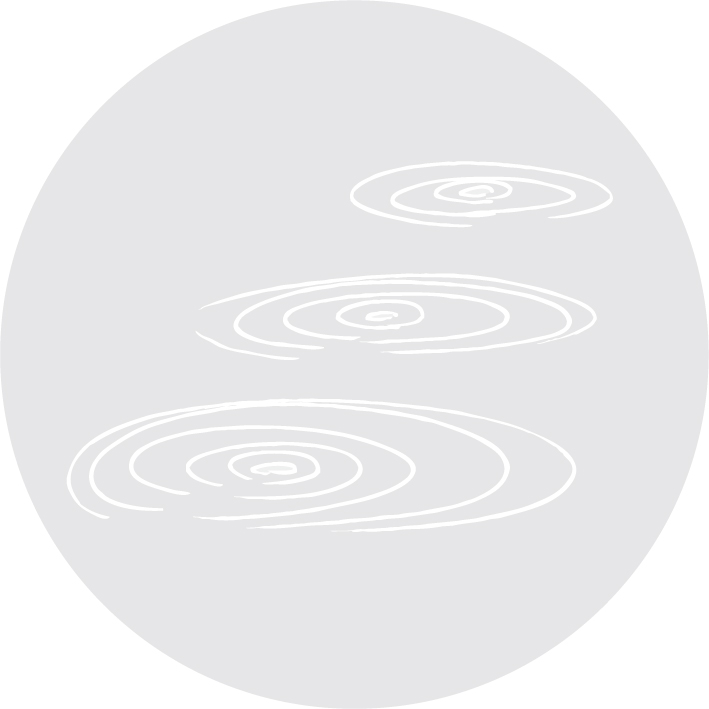Whats the deepest silence youve ever known?
You can trust the first memory that comes to you.
No need to overthink it.
As you remember the experience, see if you can settle into it. Recall where you are, whats happening around you, and who, if anyone, is present. See if you can summon the atmospherethe quality of light, the mood in the air, the feeling in your body.
Is it quiet to the ears?
Or is it the kind of silence that comes when no person or thing is laying claim to your attention?
Is it quiet in your nerves?
Or is it the kind of silence that lives deeper stilllike when the turbulent waters of internal chatter suddenly part, revealing a clear path forward?
Take a moment to consider what might sound like a strange question: Is the silence simply the absence of noiseor is it also a presence unto itself?
* * *
Over the past several years, weve been exploring these questions with an unusual mix of people: neuroscientists, activists, poets, corporate executives, national politicians, teaching physicians, environmental advocates, a whirling dervish, a White House staffer, Buddhist teachers, Christian preachers, a Grammy-winning opera singer, a man incarcerated on death row, a Hollywood sound engineer, a heavy metal front man, a cowboy-lumberjack, and an air force lieutenant colonel. Weve been exploring these questions for ourselves, too. The explorations, both personal and shared, have taken us to many places, including:
The balmy air at sunrise over a vast ocean.
The stillness amidst untrampled high mountain snow.
The questions have also taken us to places that arent auditorily quiet: Births. Deaths. Moments of awe. Moments of dramatic and unexpected change when were left grasping for familiar explanations until we finally have to surrender to the fact that theres nothing left to say.
For us and for others, moments of profound silence have sometimes come through surprisingly high-decibel settings:
Running the perfect line through roaring rapids.
Dusk in the thick woods amidst an electric orchestra of cicadas.
Yielding all self-referential thought to the whomp-whomp beat of a crowded dance floor.
If theres one common denominator to all these improbably diverse varieties of deep silence, we believe its through the answer to the last of the questions that we posed to you. The deepest silence isnt just an absence; its also a presence. Its a presence that can center us, heal us, and teach us.
In his 1836 novel, Sartor Resartus, the Scottish philosopher and mathematician Thomas Carlyle writes of a Swiss inscription: Sprechen ist silbern, Schweigen ist golden (Speech is silvern, Silence is golden).
Or, Carlyle writes, as I might rather express it: Speech is of Time, Silence is of Eternity.
This is the first known instance in English of the aphorism that inspired the title of this book. However, variants stretch back millennia in Latin, Arabic, Hebrew, and Aramaic. An early Islamic isnada lineage of transmitters of a sacred teaching across generationsholds that the origin of the proverb If speech is of silver, then silence is of gold comes from Solomon, the great king of wisdom. To this day, the words are shorthand for the wisdom of knowing when to speak and when to abide.
In our exploration of the meaning of the proverb Silence is golden, we come back again and again to the notion that true silence, profound silence, is more than the absence of noise. Its this presence, too.
BEYOND A POINT-AND-COUNTERPOINT CULTURE
In early 2017, we were pretty despondent about the state of the world. You probably know the feeling. It was well before COVID-19 and the most recent and dire reports about climate change. It was before the latest economic upheavals and the murders of Breonna Taylor and George Floyd. But, even then, we just couldnt see a way forward through the deadlock. We couldnt quite imagine a plausible vision for repairing politics, building a humane economy, or restoring our relationship with nature. It felt as if there was something blocking the capacity for deep conversation about difficult topics and, ultimately, blocking our ability to find creative solutions. Personally, as activists and advocates and parents of young kids, we were at a loss for what to do.
Around that time, we both started feeling a strange intuition. We got the same intimation of where to look for an answer: in silence.
At that particular moment, you could have called both of us lapsed meditators. But what we both felt, independently, wasnt exactly the same thing as a calling to get back on the cushion or escape to a long retreat. It wasnt an impulse to run away. Rather, it was a simple sense that the most intractable problems wont be solved with more thinking or talking. With due respect to the voice and the intellect and the buzzing machinery of material progress, we started feeling that the solutions to the most serious personal, communal, and even global challenges could be found somewhere else: in the open space between the mental stuff.
As we looked more at our intuition, we realized we were feeling something about the quality of the change necessary in the world. In the dialectical dance of human lifeaffirming/denying, progress/resistance, boom/bustare we all just doomed to endure, as Winston Churchill supposedly put it, one damn thing after another? Or is there the possibility of something more spaciousan opening, maybe even the grace of reconciliation? We werent sure. But we had a hunch about what might be the first step toward exploring the luminous possibility of transcending tired old opposites. Get beyond the noise.
We suspected this intuition might seem a little bit New Agey. So, we decided to try to write an article about it for the least New Agey publication that we could think ofHarvard Business Review. We were surprised when they accepted our proposal and more surprised when the eventual article turned out to be one of the most shared and viewed on their website in recent years. Our piece, The Busier You Are, the More You Need Quiet Time, was about silence as a path to greater creativity, clarity, and connection. We wanted to be careful not to just write another article advertising how you can get more productive through mindfulness. So we wrote about silence as the experience of resting the mental reflexes that habitually protect a reputation or promote a point of view. We called on readers to take a temporary break from one of lifes most basic responsibilities: Having to think of what to say. We did our best to offer a simple proposition that you dont often see in business or political publications: that silence isnt just the absence of something. Its a presence. It can bring genuine insight, healing, even social transformation.
A few days after the piece came out, Justin went to an economic policy conference in Pittsburgh and split a taxi back to the airport with a new acquaintance named Jeffa manufacturing executive, a practicing Catholic, and a close friend to conservative politicians. With his dark suit, his managerial demeanor, and his decidedly red-meat lifestyle, Jeff might have been the last person youd imagine sauntering into a yoga studio or contemplating a Buddhist philosophy text. As they sat in rush-hour traffic, Justin mentioned the piece, and Jeff went on to read it. Jeff reached out to Justin a little while later to say that it reminded him why he liked to go hunting in the misty, early-morning hours and why he so loved attending Jesuit youth retreats as a kid. It was a reminder that he needed to seek silence in his life.

